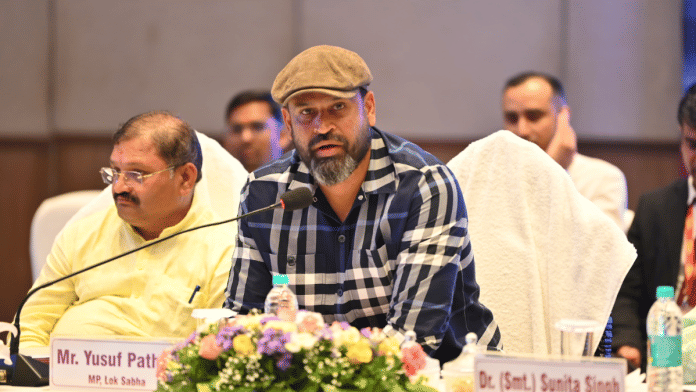New Delhi: Leniency to celebrities would send “a wrong message” and erode public faith in the judiciary, the Gujarat High Court said as it pulled up Trinamool Congress MP Yusuf Pathan for occupying a residential plot without any legal right in Vadodara.
Celebrities, the court said, cannot be given leeway when they flout the law.
Dismissing Pathan’s appeal Wednesday, the HC said that a mere offer to pay for the land would not make someone a bona-fide purchaser and that he had no legal right to the plot.
“The celebrities by virtue of their fame and public presence wield substantial influence on public behaviour and social values granting leniency to such persons despite their non-abeyance of law gives wrong message to the society and undermines public confidence in the judicial system,” Justice Mauna M. Bhatt remarked.
In doing so, the judge echoed the Supreme Court’s remarks last month in Kannada actor Darshan Thoogudeepa’s bail application in the Renukaswamy murder case, wherein the actor’s celebrity status was held not to be a mitigating factor for consideration of bail.
The cricketer-turned-politician had applied to the municipal corporation for land allotment in 2012. However, instead of putting the land up for auction, the corporation carried out a valuation of the plot and forwarded his request to the municipal commissioner, in violation of established protocol.
Pathan’s request was forwarded by the municipal commissioner to the Gujarat government, which, in June 2014, rejected the proposal for allotment of the plot. Subsequently, the municipal corporation had asked Pathan in 2024 to vacate the government-owned plot he had occupied since 2012.
Despite the rejection of his request and no allotment or legal right over the land, he built a boundary wall and continued to occupy the land. Before the court, he argued that he was willing to pay for the plot and that the municipal corporation had followed a flawed process under Section 79 of the Gujarat Provincial Municipal Corporations Act (GPMC), 1949.
Justice Bhatt, however, said that Pathan had no right to occupy the plot and that he had encroached by building the boundary wall and encroaching upon the land.
“This court says so also because without paying consideration or without any order of allotment in favour of petitioner, it would be improper on part of the petitioner to occupy the land in question and this action would amount to encroachment by creating a boundary wall,” he said.
The high court took note of the fact that Pathan was informed that his request was under consideration of the state government. Until Pathan was ordered to make payment or grant allotment, he could not be said to be the owner of the land in question, even if he had willingness to pay, it said.
Pathan could not be treated as a bona-fide purchaser as it would amount to “regularising encroachment”. “Not a single communication the petitioner is able to place on record justifying his efforts to make payment. In other words, the petitioner simply enjoyed the plot in question without there being any right over it,” the HC observed.
In his submissions, Pathan relied on Section 79 of the GPMC Act to claim that the process followed by the municipal corporation by sending the request to the government was bad in law. Section 79 did not require forwarding to the state government, he argued.
However, the court said that the provision had “no application” to Pathan’s case as it was not applicable in cases where the property vests with the municipal corporation, as was in this case.
Akshat Jain is a final-year student at the National Law University, Delhi and is a contributor with ThePrint
(Edited by Tony Rai)
Also Read: ‘Application of mind not proportionate to number of pages’—Why SC has expressed ‘anguish’ at NGT






